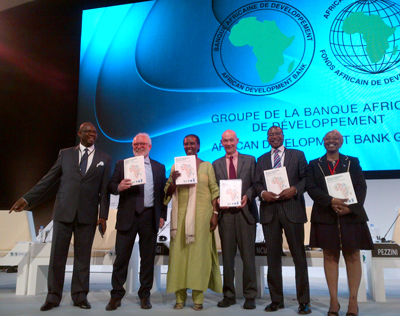Liberia
African countries need to tap global markets more effectively to strengthen their economies, says new African Economic Outlook
African countries need to tap global markets more effectively to strengthen their economies, says the African Economic Outlook 2014
Empowering people through investments in skills and technology needed to boost development
19/05/ 2014 – By participating more effectively in the global production of goods and services, Africa can transform its economy and achieve a development breakthrough, according to the latest African Economic Outlook, released at the African Development Bank Group’s Annual Meetings.
 |
The continent’s growth is projected to accelerate to 4.8 percent in 2014 and 5 to 6 percent in 2015, levels which have not been seen since the global economic crisis of 2009. Africa’s economic growth is more broad-based, argues the report, driven by domestic demand, infrastructure and increased continental trade in manufactured goods. |
“In order to sustain the economic growth and ensure that it creates opportunities for all, African countries should continue to rebuild shock absorbers and exercise prudent macro management. Any slackening on macro management will undermine future economic growth,” said Mthuli Ncube, Chief Economist and Vice-President of the African Development Bank.
“In the medium- to long-term, the opportunity for participating in global value chains, should be viewed as part of the strategy for achieving strong, sustained and inclusive growth,” he added.
The report argues that more effective participation in regional and global value chains - the range of activities in different countries that bring a product from conception to delivery to the consumer – could serve as a springboard for Africa in economic diversification, domestic resource mobilisation and investments in critical infrastructure. In order to do so, however, the continent needs to avoid getting stuck in low value-added activities.
For instance, Africa’s exports to the rest of the world grew faster than those of any other region in 2012, but they remain dominated by primary commodities and accounted for only 3.5 percent of world merchandise exports in 2012.
Avoiding that trap involves investing in new and more productive sectors, building skills, creating jobs and acquiring new technology, knowledge and market information. These interventions require sound public policies, as well as entrepreneurs that are willing and capable of helping achieve these gains.
The report uses the example of South Africa, which achieved a remarkable turnaround in its automotive industry by removing obstacles and providing incentives for component producers and assembly lines. It also shows that the development of agribusiness value chains in countries such as Ghana, Kenya and Ethiopia has contributed to economic growth and job creation.
“African economies have a great potential to build on their demographic dynamism, rapid urbanisation and natural-resources assets. The challenge now for many of them is to ensure that greater insertion into global value chains is achieved and has a positive impact on people’s lives,” said Mario Pezzini, Director of the OECD Development Centre.
“Public policies need to be articulated in a targeted strategy that promotes more equitable economic and social transformation and an environmentally sound development,” he added.
The African Economic Outlook shows that there has been remarkable progress in human development, with lower poverty levels, rising incomes and improving rates of school enrollment and health coverage.
Further achieving real human development gains requires empowering people and ensuring environmental sustainability, so that economic growth can yield benefits for all. In order for value chains to effectively integrate the poor and marginalized, often including women, targeted public policies and inclusive business models should facilitate access to productive assets such as land and financing, enhance productivity, and improve the resilience of small producers.
“As engagement with global value chains deepens, the appropriate measures need to be in place to mitigate the risks which they can bring about, such as volatile prices, unfair competition and increased vulnerability,” said Pedro Conceição, Chief Economist at UNDP’s Regional Bureau for Africa. “While regional and global economic networks present immense opportunities, women, men and communities must be able to compete from a position of strength.”
For more information on the African Development Bank’s 2014 Annual Meetings, visit www.afdb.org/am.
Official hashtags: #AfDBAM2014 and #AEO 2014.
Press contacts:
- African Development Bank: Olivia Ndong Obiang, [email protected]; T. +225 43000307 (Abidjan/Kigali)
- OECD Development Centre: Bochra Kriout, [email protected]; T: +33 (0) 6 26 74 04 03 (Paris/Kigali)
- UNDP: Joyce de Pina, [email protected], Tel:+1 917 656 3459 (New York) and Gisèle Nyampinga ; [email protected], Cell: +250 788802595 or 0782220025 (Kigali)
Related Documents
- Os países africanos devem abordar os mercados globais de forma mais eficaz para fortalecer as suas economias, de acordo com a mais recente publicação Perspetivas Económicas em África